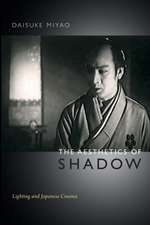Sessue Hayakawa – Silent Cinema and Transnational Stardom
Autor Daisuke Miyaoen Limba Engleză Paperback – 27 mar 2007
Preț: 303.11 lei
Nou
Puncte Express: 455
Preț estimativ în valută:
58.00€ • 60.68$ • 48.18£
58.00€ • 60.68$ • 48.18£
Carte tipărită la comandă
Livrare economică 02-16 aprilie
Preluare comenzi: 021 569.72.76
Specificații
ISBN-13: 9780822339694
ISBN-10: 0822339692
Pagini: 400
Ilustrații: 23 illustratons
Dimensiuni: 156 x 224 x 29 mm
Greutate: 0.54 kg
Editura: MD – Duke University Press
ISBN-10: 0822339692
Pagini: 400
Ilustrații: 23 illustratons
Dimensiuni: 156 x 224 x 29 mm
Greutate: 0.54 kg
Editura: MD – Duke University Press
Recenzii
Fascinating . . . an exceptionally rich and provocative study of race and national imagery at the beginnings of the Hollywood film industry.Richard Peña, Program Director, Film Society of Lincoln Center, and Professor of Film Studies, Columbia UniversityThis is the definitive work on Sessue Hayakawa. It is a work of great originality, a truly unique attempt not only to give a thorough account of the career of one of the first and most unusual stars of silent cinema but also to approach Hayakawa from the perspective of his identity as an ethnic Japanese gaining worldwide stardom. That Daisuke Miyao is able to interrogate not only Japanese sources but the Japanese-language newspapers in the United States makes this perhaps the most thoroughand complextreatment of the ethnicity of a movie star ever offered by a film historian. And Miyaos placing of Hayakawas stardom within the context of the political and cultural relations between the United States and Japan is nothing less than masterful.Tom Gunning, author of The Films of Fritz Lang: Allegories of Vision and Modernity[O]ffer[s] important new opportunities to develop our understanding of the transnational history of Hollywood cinema. From the vantage point of the particular systems of production, representation and reception concerning the deployment of East Asian actors within American narrative filmmaking, [it] uncover[s] valuable insights into Hollywood's global strategies during a time of enormous political upheaval and cultural change regarding the construction of American self-identity and the USA's attitudes to its East Asian citizens and neighbours. [Miyao] write[s] impressively from within in order to stage...understanding of the ambivalent status...of Americanization and modernization...The way that Miyao comes to...his remarkable nuanced analysis is by arguing that, like his screen persona more generally, Hayakawa embodied a mobile middle-ground between Orientalized and Americanized modes of performance...Miyao also allows us to see a more complex set of negotiations being staged within the distinctive transnational cultural force-field that Hayakawa occupied during his heyday within the Hollywood system...It is the unique achievement of Miyaos book that we are able to visualize the vectors especially of this first aspect of Hayakawas stardom for the first time. By examining the JapaneseAmerican Japanese-language press and by also discussing the critical reception of Hayakawa's films within his home country, Miyao intensifies the complexion of his history in a substantial way...propose[s] a vital contribution to the current reconceptualization of Hollywood cinema within the framework of modern international film studies. Alastair Phillips, Screen 2008, issue 49
"Fascinating ... an exceptionally rich and provocative study of race and national imagery at the beginnings of the Hollywood film industry."--Richard Pena, Program Director, Film Society of Lincoln Center, and Professor of Film Studies, Columbia University "This is the definitive work on Sessue Hayakawa. It is a work of great originality, a truly unique attempt not only to give a thorough account of the career of one of the first and most unusual stars of silent cinema but also to approach Hayakawa from the perspective of his identity as an ethnic Japanese gaining worldwide stardom. That Daisuke Miyao is able to interrogate not only Japanese sources but the Japanese-language newspapers in the United States makes this perhaps the most thorough--and complex--treatment of the ethnicity of a movie star ever offered by a film historian. And Miyao's placing of Hayakawa's stardom within the context of the political and cultural relations between the United States and Japan is nothing less than masterful."--Tom Gunning, author of The Films of Fritz Lang: Allegories of Vision and Modernity "[O]ffer[s] important new opportunities to develop our understanding of the transnational history of Hollywood cinema. From the vantage point of the particular systems of production, representation and reception concerning the deployment of East Asian actors within American narrative filmmaking, [it] uncover[s] valuable insights into Hollywood's global strategies during a time of enormous political upheaval and cultural change regarding the construction of American self-identity and the USA's attitudes to its East Asian citizens and neighbours. [Miyao] write[s] impressively from 'within' in order to stage...understanding of the ambivalent status...of Americanization and modernization...The way that Miyao comes to...his remarkable nuanced analysis is by arguing that, like his screen persona more generally, Hayakawa embodied a mobile middle-ground between Orientalized and Americanized modes of performance...Miyao also allows us to see a more complex set of negotiations being staged within the distinctive transnational cultural force-field that Hayakawa occupied during his heyday within the Hollywood system...It is the unique achievement of Miyao's book that we are able to visualize the vectors especially of this first aspect of Hayakawa's stardom for the first time. By examining the Japanese-American Japanese-language press and by also discussing the critical reception of Hayakawa's films within his home country, Miyao intensifies the complexion of his history in a substantial way...propose[s] a vital contribution to the current reconceptualization of Hollywood cinema within the framework of modern international film studies." Alastair Phillips, Screen 2008, issue 49
"Fascinating ... an exceptionally rich and provocative study of race and national imagery at the beginnings of the Hollywood film industry."--Richard Pena, Program Director, Film Society of Lincoln Center, and Professor of Film Studies, Columbia University "This is the definitive work on Sessue Hayakawa. It is a work of great originality, a truly unique attempt not only to give a thorough account of the career of one of the first and most unusual stars of silent cinema but also to approach Hayakawa from the perspective of his identity as an ethnic Japanese gaining worldwide stardom. That Daisuke Miyao is able to interrogate not only Japanese sources but the Japanese-language newspapers in the United States makes this perhaps the most thorough--and complex--treatment of the ethnicity of a movie star ever offered by a film historian. And Miyao's placing of Hayakawa's stardom within the context of the political and cultural relations between the United States and Japan is nothing less than masterful."--Tom Gunning, author of The Films of Fritz Lang: Allegories of Vision and Modernity "[O]ffer[s] important new opportunities to develop our understanding of the transnational history of Hollywood cinema. From the vantage point of the particular systems of production, representation and reception concerning the deployment of East Asian actors within American narrative filmmaking, [it] uncover[s] valuable insights into Hollywood's global strategies during a time of enormous political upheaval and cultural change regarding the construction of American self-identity and the USA's attitudes to its East Asian citizens and neighbours. [Miyao] write[s] impressively from 'within' in order to stage...understanding of the ambivalent status...of Americanization and modernization...The way that Miyao comes to...his remarkable nuanced analysis is by arguing that, like his screen persona more generally, Hayakawa embodied a mobile middle-ground between Orientalized and Americanized modes of performance...Miyao also allows us to see a more complex set of negotiations being staged within the distinctive transnational cultural force-field that Hayakawa occupied during his heyday within the Hollywood system...It is the unique achievement of Miyao's book that we are able to visualize the vectors especially of this first aspect of Hayakawa's stardom for the first time. By examining the Japanese-American Japanese-language press and by also discussing the critical reception of Hayakawa's films within his home country, Miyao intensifies the complexion of his history in a substantial way...propose[s] a vital contribution to the current reconceptualization of Hollywood cinema within the framework of modern international film studies." Alastair Phillips, Screen 2008, issue 49
Notă biografică
Textul de pe ultima copertă
"Sessue Hayakawa has not received the attention he deserves as one of the most popular and prolific stars of the American silent screen, and this book brings a wealth of material to light. Without replicating existing research, Daisuke Miyao makes an important contribution to three developing areas within film studies: new approaches to the history of early silent film, studies of the impact of Asian Americans on Hollywood, and studies of transnational links among various film industries around the world."--Gina Marchetti, author of "From Tian'anmen to Times Square: Transnational China and the Chinese Diaspora on Global Screens, 1989-1997"
Cuprins
Descriere
Critical biography of Sessue Hayakawa, a Japanese actor who became a popular silent film star in the US, that looks at how Hollywood treated issues of race and nationality in the early twentieth century










